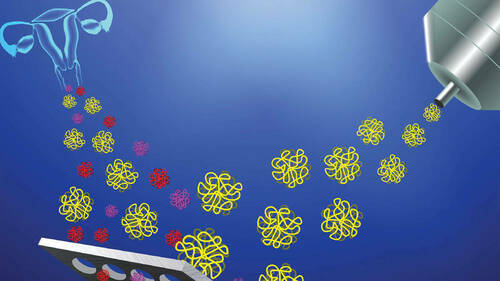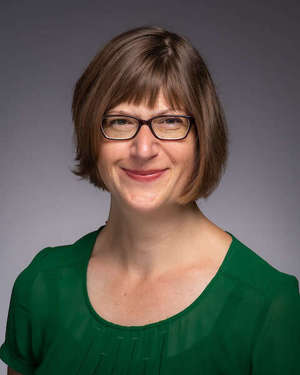
When a woman is diagnosed with ovarian cancer, it is likely that the first symptom she experiences is the accumulation of fluid in the abdominal cavity, called ascites. Beyond being uncomfortable, ascites helps spread the disease to other organs in the abdomen, such as the liver, stomach, and small and large intestines. One reason ovarian cancer is so deadly is that the symptoms of ascites are often confused with other less serious conditions, delaying correct diagnosis and potentially life-saving treatment.
Researchers at the University of Notre Dame and the University of Wisconsin-Madison are working to understand the impact of ascites on the spread of ovarian cancer by developing a new analysis technique. Their study, featured on the cover of Analyst, explains how the technique helps separate the protein CA125 from ascites. CA125 helps cancer evade the immune system and is considered a clinically significant biomarker of ovarian cancer.

“Isolating and studying CA125 has remained a challenge because only a few molecules reside within a large amount of ascites fluid and this protein is also quite large,” said Rebecca Whelan, associate professor in the Department of Chemistry and Biochemistry and co-author on the paper. “Before we could consider how to make the protein size more manageable to study, we had to figure out a process to isolate CA125 from other proteins in the fluid.”
Mark Etzel, an emeritus professor at UW-Madison and study co-author, specializes in bio-separation processes for proteins. With Etzel’s expertise, researchers were able to isolate and purify the CA125 protein found in ascites fluid retrieved from ovarian cancer patients at University Hospital in Madison, Wisconsin.
Along with ascites fluid, tumor and blood samples were also collected with the help of study co-author Manish Patankar, professor of obstetrics and gynecology at UW-Madison. And while patient data was de-identified for anonymity, the research team did maintain important information like patient age, which could potentially show how CA125 differs from patient to patient.
Once the CA125 had been separated from ascites fluid, it was sent to Notre Dame as less than a teaspoon of colorless liquid. Then Whelan’s research team used “molecular scissors” to break the large proteins into peptides, a more manageable size for analysis.
“CA125 is already used by doctors to test how ovarian cancer is progressing. An increase of CA125 in a patient’s blood would indicate growth of the disease,” said Whelan. “As measurement scientists, our team at Notre Dame is aiming to take our understanding of CA125 a step further. We wanted to make it possible to not only quantify the amount of proteins in ascites, but also study how these proteins may vary in their makeup from patient to patient.”
Researchers were able to develop the tools and methods they need to isolate CA125 and study it. Now they are analyzing how certain variables, such as age and disease progression, may correlate to the protein’s makeup and how that makeup could affect ovarian cancer progression overall.
Additional study co-authors include Naviya Schuster-Little, graduate student in the Chemistry-Biochemistry-Biology Interface Program at Notre Dame, and Roberta Fritz-Klaus, Niharika Patankar and Saahil Javeri of UW-Madison. This research was funded by the National Cancer Institute, Notre Dame’s Advancing Our Vision Fund and the University of Wisconsin’s Comprehensive Cancer Center.
This research was supported by Notre Dame’s Mass Spectrometry and Proteomics Facility and the Gyna Girls, a Riverbend Cancer Services gynecologic cancer support group. Whelan is an affiliated member of Notre Dame’s Harper Cancer Research Institute and the Institute for Precision Health.
Contact: Brandi Wampler, research communications specialist, Notre Dame Research, brandiwampler@nd.edu, 574-631-8183; research.nd.edu, @UNDResearch
Originally published by at research.nd.edu on Feb. 5.